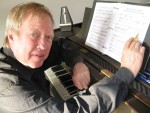Column Name
Title
One of George Quincy’s boyhood pastimes was to stretch out in a bed of grass and lose himself in the sprawling night sky that canopies Oklahoma Indian land. In its duality of modesty and majesty, such an image is an apt musical signature of the pianist-composer, whose body of work is influenced by his provenance. Quincy (B.S. ’61, M.S. ’62,piano) has 11 ASCAP awards to his credit, among them one for his 2003 release, Choctaw Nights.
Body
Recorded by the chamber group the New York Five, Choctaw Nights captures the unique lyrical quality that Quincy says he finds appealing in Amerindian music. It also sounds like a musical transcript—rendered through flute, bassoon, violin, viola, and piano—of Quincy’s reflections on growing up in his hometown, McAlester. Jupiter, a standout on the disc, came about because, in retrospect, he recognizes an inner void underlying his affinity for outdoor solitude.
“I’d spend time lying and looking at stars, trying to pick out heavenly bodies, in part as a means of dealing with missing a male presence,” says Quincy, whose parents divorced when he was an infant. He didn’t meet his Choctaw father (Quincy’s mother is white) until age 30. Longing to fulfill that need, he sought connection both with nature and the richness of Indian culture in his community. There, Quincy found various cultural activities that affirmed his Native American heritage and exposed him to musical instruments, such as the water drum and rain stick, that he now incorporates in his compositions.
One of Quincy’s recent coups was a Smithsonian Institution performance of a piece commissioned by the Queen’s Chamber Band for the 400th anniversary of the founding of Jamestown. Quincy’s Pocahontas at the Court of James I(with a libretto by his wife, Thayer Burch) was performed last November at the National Museum of the American Indian.
He says that many ideas for new pieces come through dreams, and that he works out what he hears in his sleep on the piano. It may seem curious that, with such honors from ASCAP and Meet the Composer, Quincy never took a composition class in his life. As he talks about his musical journey, he is quick to point out the many textbook prescriptions that remain unchecked.
For years prior to his first formal piano lesson, Quincy had to make do with learning by ear as his older sister practiced for her lessons. He also had to coax his mother into letting him study, since she initially felt piano was more appropriate for girls than boys. He took a job at 14, determined to pay for his own lessons. Two years later, upon his first competition win, he decided he wanted to be a classical musician, despite his mother’s attempts to steer him toward rock.
Following the call of classical music, Quincy entered Oklahoma University. At the end of his sophomore year when he wanted to transfer to Juilliard, people in McAlester raised money to pay for his New York City audition. He was accepted into Juilliard on scholarship. But during his first weeks at the School, Quincy says, he felt just as green as all the money that had come his way, compared to the students who had spent their whole lives studying their instruments. During his first piano lesson, his teacher, Alton Jones, stopped him and said, “You don’t really know anything, do you?” Quincy responded, “That’s why I’m here.”
His years at Juilliard helped to define his musical path. Toward the end of his study, an unexpected job offer from choreographer Martha Graham would lead to further growth as a musician and help him find his voice as a composer. “She taught me how to be an artist,” says Quincy, who was her rehearsal pianist and musical advisor for years. Observing Graham’s work with her company gave him a sense of the all-out sacrifice that an artist could make for her art. After graduating, he taught in Juilliard’s Literature and Materials department for five years, working with students in the Dance Division.
Quincy says he discovered his own gift for melody around this time, when he began to write incidental music and encores for Off-Off-Broadway shows. After two years of classical piano performance consisting mostly of “the same recital, every night” in different venues, he was ready to turn a corner. Quincy says he stepped into a larger self when he gave voice to his own melodies and focused on work styles that allowed for deeper interpersonal connections.
A member of the First Nations Composer Initiative, Quincy is working on a piece for Native American flute, titledChoctaw Diaries (for which he has received a grant from the American Composers Forum) and planning a new CD with the New York Five.
“I’ve always taken things as they come,” he says. “I just stayed open to where the road leads. That’s how you find out who you are, what you can do well.”





